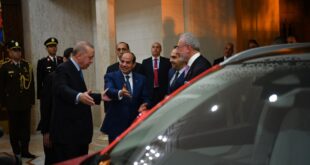The opposition has its own problems. Many of its leaders are unpopular because of the corruption, ineptitude, political paralysis and economic stagnation when they were in government.
The low voter turnout in Tunisia’s parliamentary elections reinforces the need for the country to “further expand political participation” in the coming months, a US State Department spokesman said on Sunday.
Only 8.8% of Tunisian voters cast ballots in Saturday’s parliamentary elections, the country’s electoral commission announced, after most political parties boycotted the vote.
“The parliamentary elections … represent an essential initial step toward restoring the country’s democratic trajectory,” US State Department spokesman Ned Price said in a statement.
“However, the low voter turnout reinforces the need to further expand political participation over the coming months,” he added.
Analysts in Tunis said the US reaction to the lacklustre ballot was almost kind to President Kais Saied compared to the harsh criticism levelled at the Tunisian leader by the domestic opposition figures many of whom called on him to step down and hold early elections.
Saied, a former law lecturer who was politically independent when elected president in 2019, has described the elections as part of a roadmap for ending the chaos and corruption that he said afflicted Tunisia under the previous system.
He now faces choices to: ignore the abstentions and carry on regardless; compromise with opponents or double down on his solitary approach to power by saying Tunisians have rejected the whole idea of a parliament. Whatever his decision, most analysts do not expect him to swerve from his political agenda and opt for more inclusive politics.
With Tunisia facing economic crisis, a possible collapse in state finances and the need for a foreign bailout that would require huge cuts in public spending, the political heat on both Saied and his foes is only set to rise.
Until now, Saied’s project to remake the political system has relied on the popular legitimacy he claims from a landslide 2019 presidential election victory against a media mogul facing corruption charges and the spontaneous street celebrations when he shut down parliament.
Saied, 64, has presented his actions as not only legal, but necessary to save Tunisia from a dire national crisis created by the very political leaders who now form the main opposition.
However, when he wrote a new constitution this year and put it to a referendum, only about 30% of eligible voters took part. Saturday’s very low turnout strongly reinforced a perception of declining public support for his plans.
On Saturday night the main opposition coalition said for the first time that his presidency was no longer legitimate and called for elections to replace him. A rival opposition party said the same.
As a political independent, Saied lacks the nationwide support of a party apparatus that can mobilise on his behalf. He has also alienated potential allies, such as the powerful labour union, by refusing to include them in his plans.
The opposition has its own problems. Many of its leaders are unpopular because of the corruption, ineptitude, political paralysis and economic stagnation when they were in government. It is divided among factions that despise each other as much as they distrust Saied. And it has not shown it can mobilise the mass street protests it says it wants.
Selling fruit from his truck in Tunis on Sunday, Salem Aoun said Saturday’s low turnout “was not a victory for the opposition but a defeat for Saied”.
Political events are likely to be driven by Tunisia’s unfolding economic crisis.
Ratings agencies have said the government may default on sovereign debt, an event that would immediately cause enormous hardship among many of Tunisia’s 14 million people.
Avoiding that disaster would probably require an international bailout through a deal the government is negotiating with the International Monetary Fund.
But to finalise the deal the government must show it can carry out public spending cuts that may at least in the short term make impoverished Tunisians poorer still.
Successive coalition governments during the last decade engaged in populist policies and failed to find a fix for public finances that could satisfy lenders without prompting a domestic backlash. A weakened president is unlikely today to venture into the same terrain by implementing painful economic reforms. The same quandary still remains in place.
Most analysts are wary of the possible deterioration of the situation and the prospect of growing instability in the next coming months as the country is caught between a stuttering political process and severe economic crisis.
 موقع وجه أفريقيا موقع وجه أفريقيا هو موقع مهتم بمتابعة التطورات في القارة الأفريقية
موقع وجه أفريقيا موقع وجه أفريقيا هو موقع مهتم بمتابعة التطورات في القارة الأفريقية



